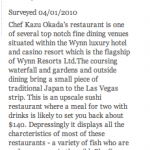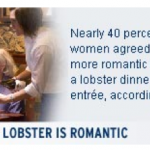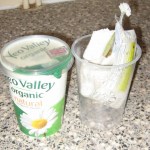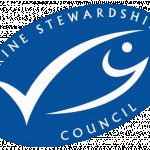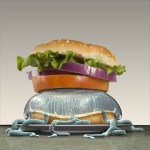Food Systems
Vertical agitation meets shame in Fish2Fork, a new seafood conservation effort led by Charles Clover (author of End of the Line), which seeks to highlight which restaurants are best and worst when it comes to the seafood they sell. The focus on restaurants is a great move and I particularly like how Fish2Fork highlights the 'top 10' and 'bottom 10' restaurants.
As a quibble, I wish the "We say..." bit on Fish2Fork was a little less whimsical and the main reasons for the negative (or positive) rating were right up top. For instance, Okada, a sushi restaurant in Las Vegas, sells bluefin tuna…
To make a real difference, we're going to have to change patterns of consumption at levels higher than just households. This vertical agitation can take lots of different forms, but I want to highlight some of the great work being done academically and on the ground. Last year, an article in the International Zoo Yearbook by Heather Koldewey and two colleagues pointed out that zoos and aquariums should be leading the way in the push for sustainable seafood. Indeed, as the authors, point out, some already are.
Chicago's Shedd Aquarium, for instance, has teamed up with a culinary school to…
Bluewashing. It's everywhere. In his article Beware of 'bluewash': Which fish should you buy? Nic Fleming covered our research on confusing seafood eco-labels in this week's NewScientist.
In addition to the dangers of seeming eco-friendly, consumers are also up against an industry very set on convincing consumers seafood is healthy. Earlier this week, Dr. Melina Jampolis, the CNN diet and fitness expert, got the question: Is farm-raised salmon as healthy as wild? She consulted a senior vice president for research of the Environmental Working Group, who said:
Eating farmed salmon…
Remember when food was just food? I don't. But I try to imagine it sometimes. I grew up in the throes of fast food, Halloween candy, and plates of bacon at breakfast buffets only to learn that I was just another victim of the food processing industry. Food issues are fascinating if for no other reason that they instill a constant sense of humility.
It took me traveling to South America to realize that popcorn could be made on a stove rather than in a moist microwaveable package. It's all very embarrassing.
But I am a human and his highly engineered crappy food is designed to appeal to…
Oliver Morton wrote a delightful book all about photosynthesis called Eating the Sun: How Plants Power the Planet, which I reviewed earlier this year for Search Magazine (R.I.P.) under the title "A Song for the Heartless". One of my favorite passages in the book beautifully explains the difference between art and science:
Discoveries feel determined. They are there to be made, and if one person doesn't, another will. This doesn't lessen the achievement; indeed it can give it spice. The thought that 'this is the way the world is--and I am the first to see it as such' is an intoxicating…
In North America, we have thick plastic yogurt containers (come to think of it, we have thick yogurt, too) that one could use over and over and over again (except almost no one does). I don't understand why we don't do it like they do in the UK, where they have these really thin plastic containers that are sheathed with cardboard labels. It seems to me that there is overall less waste and both container and label can be recycled.
There is a reason people are pushing for increased marine protected areas (which currently protect less than 0.1% -- yes, that decimal place is supposed to be there -- of our ocean from fishing). MPAs work. That's why in California they passed legislation ten years ago to create an underwater national park system. Now, finally, the project is underway. But not without some contention. Some fishermen are not too happy about closing areas to their industry. But spot prawn lovers are also sulking.
In the LA Weekly, a food blogger wrote this lede:
Your favorite Santa Barbara spot prawn dish…
A lot of people who don't want to feel guilty about eating seafood will look for the MSC logo. The MSC (or Marine Stewardship Council) supposedly certifies sustainable fisheries. They aim to reward good fisheries management by providing access to niche markets (the same markets concerned with their bread slicers) and the lure of higher profits (although this hasn't seemed to happen so far). Four recent events reveal the fishiness of MSC-certification -- a process many fisheries scientists supported at its inception but now doubt.
1) Certified wasted fish
Daniel Pauly and I have an article…
The test is simple: read this sign (recently photographed at my local Vancouver market, which is owned by Whole Foods) then gauge your response...
When Daniel Pauly first began talking about jellyfish burgers, he did so as an absurd metaphor. I blogged about it and, with the help of Sherman Lai, made this rudimentary burger:
Then, we upped the jellyfish burger ante when digital artist Dave Beck and I made this fancier version:
Meanwhile, jellyfish are on the rise everywhere and this summer the jumbo Nomura jellyfish are likely to again invade Japan.
And, on the flip side, jellyfish are now being made into all sorts of things, including, most recently, burgers. This Japanese website, translated by a friend who reads Japanese, is…
The End of the Line, a documentary on global overfishing sparked by Charles Clover's book by the same title, has sparked many public conversations about global overfishing.
The latest discussion takes place today at SEED magazine, where several fisheries experts (many of them make appearances in the film) gave their impressions of the problem. I also provided a few recommendations: deal with pigs and chickens, eat local and leave seafood for survival, consider a seafood boycott, and agitate vertically rather than laterally.
As a way of counteracting some of the work by Environmental Working Group, the Sea Turtle Restoration Project, and Oceana to inform consumers about the health risks of consuming too much seafood, a new website was just launched called HowMuchFish.com, which tells you how much mercury-laden tuna, salmon, and shrimp you can 'safely' consume.
Although it might not be obvious at first glance, HowMuchFish.com is sponsored by the Center for Consumer Freedom -- "a nonprofit coalition of restaurants, food companies, and consumers working together to promote personal responsibility". Check out their…
With the shortages and environmental impacts of global meat (including ocean meat, aka seafood), perhaps we should be turning to introduced rodents and insects for future meals. We might be forced to turn to jellyfish, too. Check out the jellyfish burger that artist Dave Beck and I created -- now on display in a Discover gallery piece on whether Vermin is the Meat of the Future.
Not to beat a dead horse (although that horse could possibly help alleviate the demand for tuna) but I wanted to clarify some of the arguments against eating seafood or, rather, in favor of marine life. Here I address some specific (and broader) questions in response to my recent posts.
Isn't there sustainably harvested seafood out there we can eat?
In theory, we should be able to harvest seafood sustainably. I am not ruling out this possibility, although most scientists are very hard pressed to name several truly sustainably managed fisheries (note on the rule of sustainability: things…
Because food issues are "one of the most interesting social movements afoot right now", I thought I would continue the discussion over whether we should give up eating seafood just a bit longer and point out the recent post at Animal Planet asking if we should boycott seafood altogether? Why is giving up seafood so unpalatable (other than for the obvious reason that some people find it delicious)? I am sure some people would find manatee meat tasty, too. Does that mean we should eat them to extinction?
Whether we should continue eating seafood is a hot topic this week. While I was arguing (again) that we should give up eating seafood, Mark Bittman at the New York Times had a nice piece on how seafood has changed through his lifetime and how the days of "see it/eat it" are over. However, he stops short of a strong stance and tries to justify his continued seafood consumption:
One could argue, as I sometimes do (mostly to myself), that one shouldn't eat fish at all, fearing that if fish lovers begin consuming those few remaining species that are not in trouble -- sardines, mackerel, squid…
Today (which, as happenstance would have it, also happens to be World Ocean Day) the environmental and conservation news site Mongabay.com ran an interview with me on why we should stop eating seafood. I think that if we can get people to feel about fish the way they feel about birds it should be easier to save them...
In some ways, [fish] are not that different from birds and, as anyone who has ever been to England knows, there is no shortage of sentiment for avian species. Fish often travel in flocks and flash beautiful colors. Like the albatross, tunas cover remarkable migratory distances…
Remember our old friend surimi?
I am looking for people who love surimi or hate it. Those who can remember their first time eating it (knowingly or not). Those who think it's delicious. Those who find it revolting. It would be useful for an article I am working on...
Molded surimi lobsters:
A blogpost over at GOOD magazine* reviews a new book on veganism, applauds the book for its flexible approach, and says we should "give up trying to guilt people into not eating any meat." The post mentions the environmental impacts of meat, which are indeed significant (according the the UN, rearing cattle produces more greenhouse gases than driving cars), but does not venture much further in the realm of why there is a guilt campaign around meat eating (which, I would argue, has been a fairly weak campaign -- the potential for gruesomeness hardly fulfilled at all).
If it is not yet clear…
In an extension of first shifting baselines post where Randy Olson and I argued over whether to continue eating seafood, I wrote a guest post last week for The Reef Tank titled What happened to your clients? Um. We ate them. It begins:
"So. What happened to our fish?" asks The Future.
"Um. Well. We ate them," respond the people who were hired to protect the very marine life that directly or indirectly wound up on their dinner table: wild salmon, tuna, coral reefs.
The culprit of the overfishing crisis is small but insatiable: the human stomach. But most people working in marine science…
